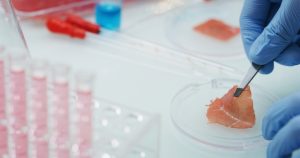One of the hurdles lab-grown meat faces is competing with realistic-looking and tasty natural products — part of that equation is finding out how to mimic the marbled effect that animal fat gives meat.
A University of Massachusetts Amherst food scientist plans to tackle this quandary by developing new technology supported by a $250,000 grant from animal activist-founded Good Food Institute. Created in 2016 by Mercy for Animals, which advocates for a completely vegan lifestyle, the Good Food Institute promotes plant and cell-based alternatives to animal products, particularly meat, dairy, and eggs.
The technology is being proposed by assistant professor Lutz Grossman, and the institute claims it “has the potential to revolutionize the plant-based meat industry, expanding its product offerings and appealing to a wider audience.” The grant in Massachusetts is just one of 118 awarded in 21 countries, totaling more than $21 million, since 2019.
Grossmann, whose research focuses on designing holistic approaches to increase the consumption of plant- and microbial protein-rich foods, aims to incorporate lipids into high-moisture extrusion processes, a technique used to replicate the juiciness, appearance, and texture of whole-muscle animal meat.

“While high-moisture extrusion has become a primary method for creating meat-like textures from plant proteins, it currently lacks the ability to generate lipid marbling, a key characteristic for replicating the appearance, flavor, and texture of traditional meat products,” Grossmann explains. “The challenges of incorporating lipids into high-moisture extrusion processes are mainly related to the lubricating effect of plant lipids that disrupt the protein melt within the extruder barrel.”
In addition, injecting lipids during the cooling part of the process — when the meat-like structure is finalized — results in uneven distribution, leading to suboptimal texture, he adds.
To overcome these challenges and bridge the gap between plant proteins and lipids, Grossmann is developing and will implement a novel extrusion segment that will facilitate the creation of the marbled appearance and texture of plant-based whole-cut meat products.
“The setup basically works like a piping bag that allows for making a two-colored swirl,” Grossmann says.
Lab-grown meat has met resistance from states such as Alabama and Florida, which have banned the sale of biotech meat. The products face concerns such as consumer safety and protecting animal agriculture. Meanwhile, adherence to food safety laws, and environmental impacts are also a concern.
Bans on the sale of lab-grown meat reflect concerns over consumer safety and the protection of animal agriculture. Unlike traditional animal proteins, which are subject to rigorous regulation and testing, lab-grown meats may not yet have established the same level of oversight.
»Related: Survey tallies consumer attitudes on lab-grown meat alternatives


